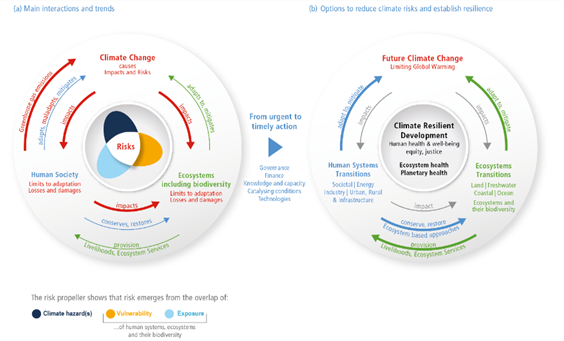The Working Group II Contribution to the 6th Assessment Report IPCC report was released on 28 February 2022. In this report the risk and vulnerabilities of the climate change on every individual have been reported and how the climate change in impacting the physical and mental health of the people is mentioned. The observations mentioned in the report are more alarming than ever.

A summary of the observed impacts and the risks identified in the report are given below.
The Observed Impacts from Climate Change
- Widespread, pervasive impacts to ecosystems, people, settlements, and infrastructure have resulted from observed increases in the frequency and intensity of climate and weather extremes, including hot extremes on land and in the ocean, heavy precipitation events, drought and fire weather.
- Climate change has caused substantial damages, and increasingly irreversible losses, in terrestrial, freshwater and coastal and open ocean marine ecosystems.
- Climate change including increases in frequency and intensity of extremes have reduced food and water security, hindering efforts to meet Sustainable Development Goals.
- Climate change has adversely affected physical health of people globally and mental health of people in the assessed regions.
- In urban settings, observed climate change has caused impacts on human health, livelihoods and key infrastructure.
- Overall adverse economic impacts attributable to climate change, including slow-onset and extreme weather events, have been increasingly identified. Economic damages from climate change have been detected in climate-exposed sectors, with regional effects to agriculture, forestry, fishery, energy, and tourism, and through outdoor labor productivity.
- Climate change is contributing to humanitarian crises where climate hazards interact with high vulnerability. Climate and weather extremes are increasingly driving displacement in all regions, with small island states disproportionately affected.
Risks Projected in near future
- Near-term warming and increased frequency, severity and duration of extreme events will place many terrestrial, freshwater, coastal and marine ecosystems at high or very high risks of biodiversity loss.
- Global warming, reaching 1.5°C in the near-term, would cause unavoidable increases in multiple climate hazards and present multiple risks to ecosystems and humans.
- In the near term, climate-associated risks to natural and human systems depend more strongly on changes in their vulnerability and exposure than on differences in climate hazards between emissions scenarios.
- Continued and accelerating sea level rise will encroach on coastal settlements and infrastructure and commit low-lying coastal ecosystems to submergence and loss.
- Violent conflict and, separately, migration patterns, in the near-term will be driven by socio-economic conditions and governance more than by climate change.
Time to Act and limit the Climate Change
The report has clearly alarmed about the climate change risks to the people if proper actions are not taken on time. We have to take aggressive strategies to reduce the Greenhouse Gas emissions. The actions taken today will take years to show the effect, but we have to act today to protect our future. A collective efforts from the Individuals, business, communities and governments is required to achieve the target of 1.5 degree by the end of the century.
See: How Can I Contribute to Reduce Global Warming?


One thought on “Key Risks Identified in the IPCC 6th Assessment Report”